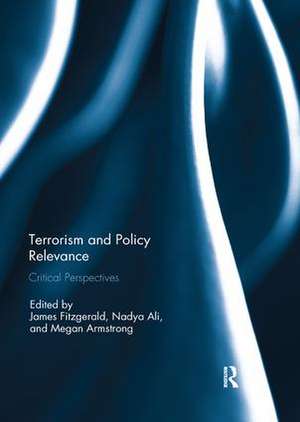Terrorism and Policy Relevance: Critical Perspectives
Editat de James Fitzgerald, Nadya Ali, Megan Armstrongen Limba Engleză Paperback – 3 ian 2019
It also reflects on Critical Terrorism Studies’ (CTS) relationship to policy-relevance. Should CTS eschew engagement with policy-relevance and maintain a position outside the orthodoxy, or are CTS scholars uniquely positioned to offer meaningful alternatives to contemporary counterterrorism practices? Read thus, the question of policy relevance is central to CTS’ identity and represents an essential juncture as to how associated scholarship might develop into the future.
| Toate formatele și edițiile | Preț | Express |
|---|---|---|
| Paperback (1) | 416.22 lei 6-8 săpt. | |
| Taylor & Francis – 3 ian 2019 | 416.22 lei 6-8 săpt. | |
| Hardback (1) | 1053.92 lei 6-8 săpt. | |
| Taylor & Francis – 4 apr 2017 | 1053.92 lei 6-8 săpt. |
Preț: 416.22 lei
Nou
Puncte Express: 624
Preț estimativ în valută:
79.65€ • 82.85$ • 65.76£
79.65€ • 82.85$ • 65.76£
Carte tipărită la comandă
Livrare economică 15-29 aprilie
Preluare comenzi: 021 569.72.76
Specificații
ISBN-13: 9780367142209
ISBN-10: 0367142201
Pagini: 164
Dimensiuni: 174 x 246 x 9 mm
Greutate: 0.45 kg
Ediția:1
Editura: Taylor & Francis
Colecția Routledge
Locul publicării:Oxford, United Kingdom
ISBN-10: 0367142201
Pagini: 164
Dimensiuni: 174 x 246 x 9 mm
Greutate: 0.45 kg
Ediția:1
Editura: Taylor & Francis
Colecția Routledge
Locul publicării:Oxford, United Kingdom
Public țintă
Postgraduate and UndergraduateCuprins
1. Editors’ introduction: critical terrorism studies: reflections on policy-relevance and disciplinarity 2. Critical terrorism studies, victimisation, and policy relevance: compromising politics or challenging hegemony? 3. Terror from behind the keyboard: conceptualising faceless detractors and guarantors of security in cyberspace 4. "Read it in the papers, seen it on TV…": the 1981 Libyan hit squad scare as a case of simulated terrorism in the United States 5. Ask the audience: television, security and Homeland 6. Interrogating representations of "militants" and "terrorists" in the United States’ Militant Imagery Project and the Counterterrorism Calendar 7. To be or not to be policy relevant? Power, emancipation and resistance in CTS research 8. Dialogue, praxis and the state: a response to Richard Jackson 9. Counter-radicalisation policy across Europe: an interview with Maarten van de Donk (Radicalisation Awareness Network) 10. Frontline perspectives on preventing violent extremism: an interview with Alyas Karmani (STREET UK) 11. West German radical protest in the long 1960s
Notă biografică
James Fitzgerald is Lecturer in Terrorism Studies at the School of Law and Government, Dublin City University and co-convenor of the BISA Critical Studies on Terrorism Working Group. His current research interests include everyday resistances to (counter)terrorism; the political ontology of terrorism; and exploring (in)orthodoxies of "academic writing" and the types of knowledge produced thereof.
Nadya Ali is a Lecturer in International Relations at the University of Sussex. She is currently a co-convenor of the BISA Critical Studies on Terrorism Working Group. Nadya has published on topics including the female jihad, counter-radicalisation in the UK and UK mosque reforms in the last decade.
Megan Armstrong is co-convenor of the BISA Critical Studies on Terrorism Working Group. Her main research interests focus on examines the role of the sexualised body in violent identity politics.
Nadya Ali is a Lecturer in International Relations at the University of Sussex. She is currently a co-convenor of the BISA Critical Studies on Terrorism Working Group. Nadya has published on topics including the female jihad, counter-radicalisation in the UK and UK mosque reforms in the last decade.
Megan Armstrong is co-convenor of the BISA Critical Studies on Terrorism Working Group. Her main research interests focus on examines the role of the sexualised body in violent identity politics.
Descriere
Explores the interrelationship between terrorism and policy relevance from a range of critical perspectives. In particular, it questions the politics of policy-relevance; that is, it interrogates how epistemological and practical pressures to produce "policy-relevant" research shapes prevalent understandings of (counter)terrorism, and vice-versa.
